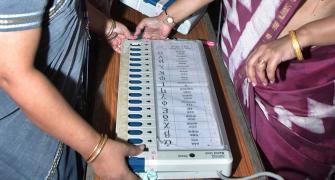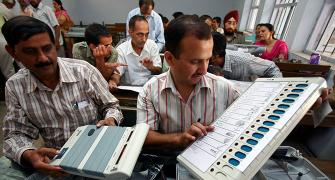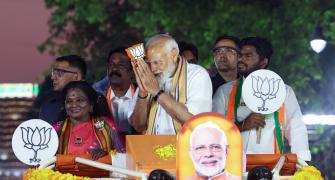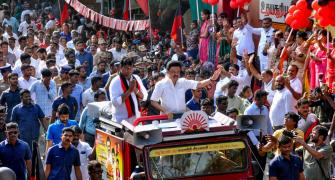The weekend's presidential elections in Taiwan, the fourth direct elections in this island from 1996, surprised few people, with the more charismatic candidate Ma Ying-jeou winning the post of President. Change is the watchword in these elections with portends clear since the beginning of the year.
The January 12 legislative elections gave the nationalist Kuomintang party nearly 72 percent of the votes. With Ma's election now, the KMT will have the unique distinction of having an absolute majority in the executive and legislative wings of Taiwan. Also, with the two referendums unable to muster a majority of Taiwanese support, the KMT will be relatively free to deal with China and other countries.
Nearly 13 out of 17 million Taiwan's eligible voters (out of its nearly 22 million population) voted in about 14,000 polling booths -- accounting for nearly 76 percent of voter turnout, compared to a slightly more turnout in the previous presidential elections held in 2004. The KMT presidential and vice presidential candidates Ma Ying-jeou and Vincent Siew bagged 58 percent of the votes (more than 9 percent swing in their favour as compared to 2004 elections), while the Democratic Progressive Party presidential candidate Frank Hsieh and his vice presidential candidate Su Tseng-chang could get only 41 percent of the votes (about 9 percent less compared to their win in the 2004 elections).
With these elections, the Taiwanese appeared to have signaled that they would like to continue a status quo in China-Taiwan cross-Straits relations. The elections indicated that Taiwan is indecisive when it comes to its future course of action, with the defeat of the two referendums aimed at addressing its candidature in the United Nations. The DPP's efforts to enter the UN under the name Taiwan, and the KMT's efforts to enter the UN under the name of ROC -- both failed.
In 1971 the Republic of China on Taiwan lost its UN candidature to the People's Republic of China and its subsequent efforts to regain UN membership were opposed by PRC. Thus all the six proposed referendums so far could not muster a decisive support for the Taiwanese. The KMT and the DPP proposed two referendums, with the KMT accused by opponents of not being sincere in this effort. Although both the referendums attracted nearly 35 percent voters, and despite less affirmative votes cast in these referendums, these could not obtain the requisite majority support.
Taiwanese endorsement of the KMT to lead the country for the next four years appears to be more a reflection of the failures of the faction-ridden DPP and its policies in the last eight years than supporting the re-unification policies with China. Despite some progress under the DPP, unemployment rates have been gradually rising, internal debts mounting and corruption spreading, while economic growth rates were faltering despite a growth in cross-Straits business. Today Taiwan's business firms have pumped into China more than $300 billion (accounting for nearly one-third of direct investments in China), despite China's position and the targeting of Taiwan with nearly 1,000 short and medium range ballistic missiles.
While President-elect Ma indicated, during his electoral discussions that he is likely to endorse 'three links' with China (viz, direct air, sea and post and telecommunications), in addition to opening Taiwan for Chinese tourists and journalists and initiate 'common cross-Straits market' proposals, criticism of the KMT could escalate in the coming years if the KMT is seen as moving closer towards China. The United States and Japan would be closely monitoring the situation across the Straits. Against the backdrop of the current Chinese government's clamp-down on the protesting Tibetans, pro-unification efforts could prove costly for Taiwan.
India will be keenly watching how the new leadership in Taiwan would make its next move. Despite the DPP taking a more anti-Beijing and independent 'go south' trade and investment policy, New Delhi is wary of the risks involved in engaging the DPP effectively. In spite of calls in India to make Taiwan 'India's Israel' as a tit-for-tat for Beijing's pro-Pakistan policies, New Delhi is unwilling to take risks. The January 14 joint declaration between Prime Minister Manmohan Singh and China's Premier Wen Jiabao -- two days after the KMT's decisive victory in the legislative elections -- for the first time in many decades stated that India opposes any activity opposed to 'One China' principle. Such a long circuitous diplomatic formulation indicated to a cautious but 'politically correct' approach towards Taiwan on the part of South Block.
On the other hand, despite its widely known pro-China reunification policies, the KMT's stock appears to be rising in Delhi. Ma Ying-jeou visited Delhi last year and promised more business contacts with India. Taiwanese investments today are much more than Chinese investments, although India-Taiwan bilateral trade of nearly $4 billion is far less than the $40 billion in trade figures for India-China.
Srikanth Kondapalli is Chairman of Centre for East Asian Studies, JNU







